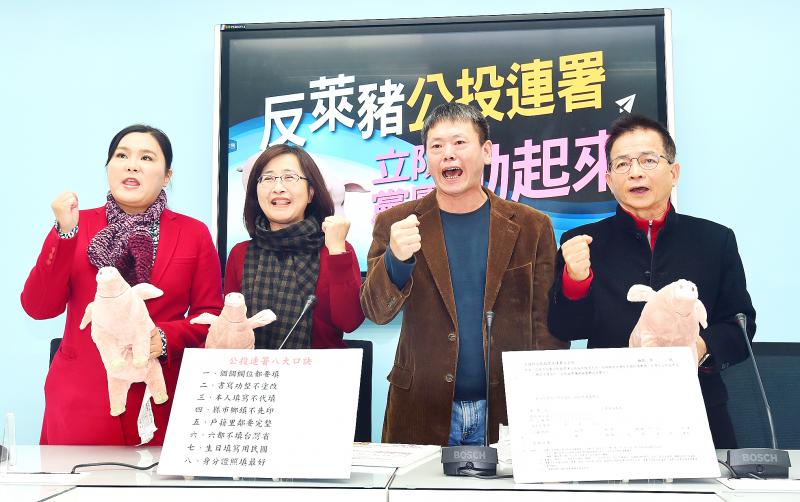The Chinese Nationalist Party (KMT) has begun to collect signatures in the second stage of its efforts to initiate a referendum opposing the government’s decision to lift a ban on pork imports containing ractopamine, it said yesterday.
The referendum question would ask: “Do you agree to a total ban on the importation of pork and related products containing leanness-enhancing additives (ractopamine and other beta-agonists)?” the KMT has said.
A referendum initiative to a needs to clear two hurdles before it can be put to a vote:

Photo: Liao Chen-huei, Taipei Times
The first requires the signatures of 0.01 percent of eligible voters in the most recent presidential election — which would be 1,931 people based on the 19,311,105 people eligible to vote last year.
That threshold was met after the signatures were obtained and approved last month by the Central Election Commission.
In line with the Referendum Act (公民投票法), the KMT in the second stage must collect the signatures of nearly 290,000 people, or 1.5 percent of eligible voters in the most recent presidential election, for the referendum to be held.
KMT caucus whip Lin Wei-chou (林為洲) told a news conference that to guard against signatures being ruled invalid, the party hopes to collect more than 500,000 by the March 21 deadline, when they must be sent to the commission for review.
The party would set up 158 collection sites across the country to reach the goal, Lin said.
Every KMT lawmaker would be responsible for collecting at least 1,000 signatures by the deadline, he said.
The KMT has 38 lawmakers in the 113-seat Legislative Yuan.
KMT Legislator Jessica Chen (陳玉珍) urged the public to support the referendum initiative to safeguard people’s health.
If the initiative is put to a vote, it would need the support of at least 25 percent of all eligible voters, or about 5 million yes votes to pass. The number of yes votes must be more than no votes.
The act stipulates that referendums can only take place every two years on the fourth Saturday in August, with the next possible date being Aug. 28.
Although ractopamine is banned for use in pigs in Taiwan over concerns about the safety of animals and humans, President Tsai Ing-wen (蔡英文) on Aug. 28 last year announced that Taiwan would ease restrictions on imports of US pork containing traces of the drug within certain limits, as well as beef from cattle aged 30 months or older.
The Democratic Progressive Party administration set maximum residue levels for ractopamine in pork to allow imports from the US.
The Legislative Yuan on Dec. 24 approved nine administrative directives related to the decision.
The change, which went into effect on Friday last week, is widely viewed as an effort by the government to satisfy US prerequisites for negotiations on a bilateral trade deal.

The brilliant blue waters, thick foliage and bucolic atmosphere on this seemingly idyllic archipelago deep in the Pacific Ocean belie the key role it now plays in a titanic geopolitical struggle. Palau is again on the front line as China, and the US and its allies prepare their forces in an intensifying contest for control over the Asia-Pacific region. The democratic nation of just 17,000 people hosts US-controlled airstrips and soon-to-be-completed radar installations that the US military describes as “critical” to monitoring vast swathes of water and airspace. It is also a key piece of the second island chain, a string of

A magnitude 5.9 earthquake that struck about 33km off the coast of Hualien City was the "main shock" in a series of quakes in the area, with aftershocks expected over the next three days, the Central Weather Administration (CWA) said yesterday. Prior to the magnitude 5.9 quake shaking most of Taiwan at 6:53pm yesterday, six other earthquakes stronger than a magnitude of 4, starting with a magnitude 5.5 quake at 6:09pm, occurred in the area. CWA Seismological Center Director Wu Chien-fu (吳健富) confirmed that the quakes were all part of the same series and that the magnitude 5.5 temblor was

Taiwan will now have four additional national holidays after the Legislative Yuan passed an amendment today, which also made Labor Day a national holiday for all sectors. The Chinese Nationalist Party (KMT) and Taiwan People’s Party (TPP) used their majority in the Legislative Yuan to pass the amendment to the Act on Implementing Memorial Days and State Holidays (紀念日及節日實施辦法), which the parties jointly proposed, in its third and final reading today. The legislature passed the bill to amend the act, which is currently enforced administratively, raising it to the legal level. The new legislation recognizes Confucius’ birthday on Sept. 28, the

The Central Weather Administration has issued a heat alert for southeastern Taiwan, warning of temperatures as high as 36°C today, while alerting some coastal areas of strong winds later in the day. Kaohsiung’s Neimen District (內門) and Pingtung County’s Neipu Township (內埔) are under an orange heat alert, which warns of temperatures as high as 36°C for three consecutive days, the CWA said, citing southwest winds. The heat would also extend to Tainan’s Nansi (楠西) and Yujing (玉井) districts, as well as Pingtung’s Gaoshu (高樹), Yanpu (鹽埔) and Majia (瑪家) townships, it said, forecasting highs of up to 36°C in those areas